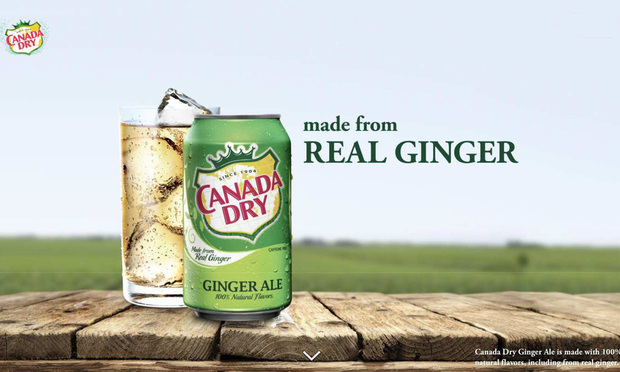Canada Dry Maker Can't Crush 'Made From Real Ginger' Suit
A federal judge in San Jose mostly turned back a request from Plano, Texas-based Dr. Pepper Snapple Group Inc. to toss the California class action finding consumers could plausibly claim they expected Canada Dry to contain ginger root rather than a ginger derivative.
November 05, 2018 at 02:32 PM
3 minute read

The maker of Canada Dry Ginger Ale couldn't shake a lawsuit brought on behalf of California consumers who claim they were misled by labeling and advertising that said the drink was “made from real ginger.”
U.S. Magistrate Judge Nathanael Cousins of the Northern District of California on Nov. 2 partially turned back a summary judgment motion from Plano, Texas-based Dr. Pepper Snapple Group Inc. finding that consumers could plausibly claim that they were misled to believe that Canada Dry contains ginger root when it actually contains a ginger derivative, ginger oleoresin.
Although Cousins found that the beverage was “literally made in part 'from' real ginger” since ginger oleoresin is derived from ginger root, he noted that the defendant's own expert survey suggested that between 11.54 to 40.59 percent of consumers believe that “real ginger” tagline might imply that Canada Dry is made using ginger root itself.
“In short, plaintiffs have shown there is a genuine issue of material fact as to whether the 'Made from Real Ginger' label misleadingly implies that Canada Dry is made with ginger root,” Cousins wrote.
The judge, likewise, sided with plaintiffs by allowing their claims that the Canada Dry's “real ginger” branding misleads consumers about the health benefits of the beverage, of which there are none. In waiving on those claims, Cousins cited internal documents from the company that found that 30 percent of consumers who increased their Canada Dry consumption did so because of the perceived health benefits.
“Simply put, it would be odd for the court to conclude that Dr. Pepper's advertisements do not affect consumer expectations regarding Canada Dry, when Dr. Pepper itself believes that it had,” Cousins wrote.
Cousins' ruling is the second recent win in the case for lead plaintiffs counsel at Gutride Safier and the Margarian Law Firm. In June Cousins certified a class of all California consumers who had purchased a Canada Dry product dating back to Dec. 28, 2012.
Gutride Safier's Adam Gutride didn't immediately respond to a request for comment.
Cousins, however, on Nov. 2 did grant Dr Pepper's motion for summary judgment on claims that the company misled consumers about the amount of ginger in Canada Dry. Cousins noted that the plaintiffs hadn't pointed to any evidence showing how much ginger consumers expected to be in the beverage and defense survey data that showed consumers exposed to the “real ginger” advertising were skeptical about the amount of ginger in Canada Dry.
Dr. Pepper Snapple Group is represented by counsel at Baker Botts. Van Beckwith, the Dallas-based chair of the firm's litigation department, said in an email that his client was pleased that the court had entered summary judgment on its behalf on some claims. He also said they were pleased that the court “struck one of plaintiffs' experts entirely and limited the scope of the opinions that may be offered by two other experts” in a related order Nov. 2.
This content has been archived. It is available through our partners, LexisNexis® and Bloomberg Law.
To view this content, please continue to their sites.
Not a Lexis Subscriber?
Subscribe Now
Not a Bloomberg Law Subscriber?
Subscribe Now
NOT FOR REPRINT
© 2025 ALM Global, LLC, All Rights Reserved. Request academic re-use from www.copyright.com. All other uses, submit a request to [email protected]. For more information visit Asset & Logo Licensing.
You Might Like
View All
Morgan Lewis Shutters Shenzhen Office Less Than Two Years After Launch

Texas-Based Ferguson Braswell Expands in California With 6-Lawyer Team From Orange County Law Firm
2 minute read

Justin Baldoni Sues Blake Lively and Ryan Reynolds for $400M in New Step in 'It Ends With Us' Fight
6 minute readTrending Stories
- 1Invoking Trump, AG Bonta Reminds Lawyers of Duties to Noncitizens in Plea Dealing
- 222-Count Indictment Is Just the Start of SCOTUSBlog Atty's Legal Problems, Experts Say
- 3Judge Rejects Walgreens' Contractual Dispute Against Founder's Family Member
- 4FTC Sues PepsiCo for Alleged Price Break to Big-Box Retailer, Incurs Holyoak's Wrath
- 5Greenberg Traurig Litigation Co-Chair Returning After Three Years as US Attorney
Who Got The Work
J. Brugh Lower of Gibbons has entered an appearance for industrial equipment supplier Devco Corporation in a pending trademark infringement lawsuit. The suit, accusing the defendant of selling knock-off Graco products, was filed Dec. 18 in New Jersey District Court by Rivkin Radler on behalf of Graco Inc. and Graco Minnesota. The case, assigned to U.S. District Judge Zahid N. Quraishi, is 3:24-cv-11294, Graco Inc. et al v. Devco Corporation.
Who Got The Work
Rebecca Maller-Stein and Kent A. Yalowitz of Arnold & Porter Kaye Scholer have entered their appearances for Hanaco Venture Capital and its executives, Lior Prosor and David Frankel, in a pending securities lawsuit. The action, filed on Dec. 24 in New York Southern District Court by Zell, Aron & Co. on behalf of Goldeneye Advisors, accuses the defendants of negligently and fraudulently managing the plaintiff's $1 million investment. The case, assigned to U.S. District Judge Vernon S. Broderick, is 1:24-cv-09918, Goldeneye Advisors, LLC v. Hanaco Venture Capital, Ltd. et al.
Who Got The Work
Attorneys from A&O Shearman has stepped in as defense counsel for Toronto-Dominion Bank and other defendants in a pending securities class action. The suit, filed Dec. 11 in New York Southern District Court by Bleichmar Fonti & Auld, accuses the defendants of concealing the bank's 'pervasive' deficiencies in regards to its compliance with the Bank Secrecy Act and the quality of its anti-money laundering controls. The case, assigned to U.S. District Judge Arun Subramanian, is 1:24-cv-09445, Gonzalez v. The Toronto-Dominion Bank et al.
Who Got The Work
Crown Castle International, a Pennsylvania company providing shared communications infrastructure, has turned to Luke D. Wolf of Gordon Rees Scully Mansukhani to fend off a pending breach-of-contract lawsuit. The court action, filed Nov. 25 in Michigan Eastern District Court by Hooper Hathaway PC on behalf of The Town Residences LLC, accuses Crown Castle of failing to transfer approximately $30,000 in utility payments from T-Mobile in breach of a roof-top lease and assignment agreement. The case, assigned to U.S. District Judge Susan K. Declercq, is 2:24-cv-13131, The Town Residences LLC v. T-Mobile US, Inc. et al.
Who Got The Work
Wilfred P. Coronato and Daniel M. Schwartz of McCarter & English have stepped in as defense counsel to Electrolux Home Products Inc. in a pending product liability lawsuit. The court action, filed Nov. 26 in New York Eastern District Court by Poulos Lopiccolo PC and Nagel Rice LLP on behalf of David Stern, alleges that the defendant's refrigerators’ drawers and shelving repeatedly break and fall apart within months after purchase. The case, assigned to U.S. District Judge Joan M. Azrack, is 2:24-cv-08204, Stern v. Electrolux Home Products, Inc.
Featured Firms
Law Offices of Gary Martin Hays & Associates, P.C.
(470) 294-1674
Law Offices of Mark E. Salomone
(857) 444-6468
Smith & Hassler
(713) 739-1250






